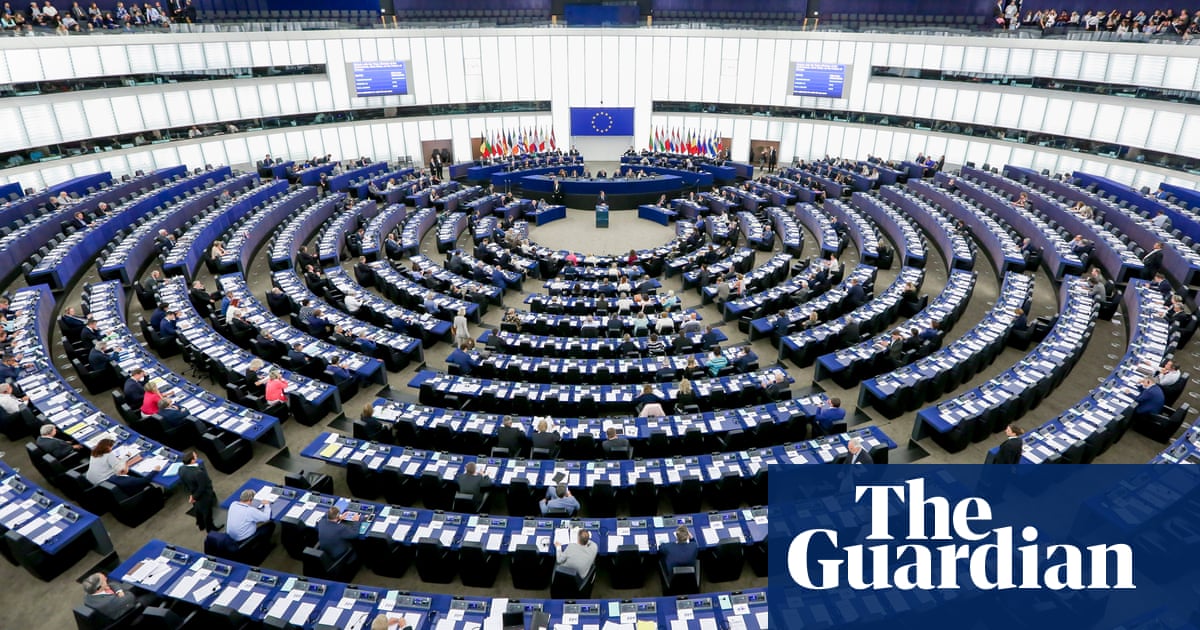I’ve been copying and pasting the articles from The Telegraph rather than just the link because the articles are now hard to find from the links, if you click on the link you’ll see what I mean. I don’t normally copy the whole article from The Daly Mail. Why haven’t you complained about the articles I’ve pasted from The Guardian.
The one from the Guardian didn’t support your argument though.
I’ve never stated that all European’s are white, but the majority are. And as The Guardian article outlines the people of power in the EU are white, which is in great contrast to the UK and when the UK left the EU they were without black MEPs.
Which particular argument, there’s been so many that you remainers have been nit picking.
Is this a joke? Of course the majority of Europeans are white, just as the majority of Great Britain is.
That is due to our geographical and historical past.
Aren’t the African and Asian governments peopled by black and brown people?
That is due to theirs.
Any workers are also bringing their families and dependents. There is no increase in infrastructure to accommodate them. So they semi-fulfil one role, let’s say the NHS, but there is a societal cost in hosting them - accommodation, schools, social services, housing stock, healthcare, translation, training.No quick way of getting back home for them any time soon given some have 15 hour v expensive flights to do so, vs maybe an hour to EU countries. They also have to find housing for their families at a time when housing stock is limited.
The article indicates aTory-proposed move to an increased wage threshold if successful will also increase cost to British consumers. It is also pointing to increased investment in AI and tech to reduce the reliance on labour in the first place, this will lead to an overall reduction in jobs for Brits in the future.
All I can see in this article is cost without benefits that would outweigh this cost - so a net loss to Britain. Long-term fewer jobs due to automation and more expensive products and services for Brits as a result of a higher wage economy vs more efficient countries. I can’t understand why you see any benefits. You haven’t been able to demonstrate the benefit in your responses. This whole process is a tangle of inefficiencies, jumbled organisation and reactionary policies.
I think Wendeey was saying the EU administration was predominantly white with blacks unrepresented.
the Guardian – 29 Aug 18

The EU is too white – and Brexit likely to make it worse, MEPs and staff…
All 28 European commissioners are white and only three of the 751 MEPs are black.
Wendeey was saying that blacks were largely unrepresented in the EU.
Well done Scot.
Think this article is worth reposting too:

Post-Brexit shift in immigration may mean higher wages and more…
Sunak faces headache over India trade deal as upheaval continues in handling overseas labour
Immigration played a key role in the UK’s decision in 2016 to leave the EU. Opinion polls showed strong support among leave voters for an end to free movement and for Westminster to decide who should be allowed to enter the country for work. That’s what the slogan “take back control” was largely about.
Since the Brexit vote, the mood has changed. There is still a feeling ministers need to do more to stop people in small boats crossing the Channel. But legal immigration has ceased to be such a hot political issue. Other issues – such as the cost of living and rising interest rates – rank as more important.
The more relaxed mood is certainly not the result of Britain pulling up the drawbridge to immigrants in the past seven years. On the contrary, net migration – the number of people arriving less the number leaving – rose to a record 606,000 in 2022.
There were some one-off factors last year – the arrival of refugees from Afghanistan and Ukraine, for example – which won’t be repeated in the future. But even ignoring the people fleeing wars and persecution, the number of non-UK nationals either working or looking for a job rose by 257,000 in 2022. As Samuel Tombs, a UK economist at Pantheon Macroeconomics, has pointed out, immigration accounted for almost all the 0.9% increase in the size of the workforce in the year to the second quarter of 2023. Foreign-born workers have plugged the gap left by a shortage of domestic candidates and so helped ease supply shortages.
There has been a marked shift in where the new foreign-born workers are coming from. Before Brexit, free movement under the rules of the single market meant the vast majority arrived from EU countries. Under the points-based system, workers can arrive from anywhere in the world, provided they meet certain criteria. These include having a job offer of a certain skill level, that they can speak English and that they will be paid more than £26,200 a year.
The latest data shows that the four countries that secured the most work visas were India, Nigeria, Zimbabwe and the Philippines, with about half plugging gaps in the health and social care sector. Britain’s gain, inevitably, comes at the expense of poorer countries losing some of their brightest and best workers, even if they send a chunk of the money they earn home through remittances.
Some “red wall” Conservative MPs have called for much tougher immigration controls, including raising the minimum salary required for a skilled overseas worker to £38,000. This would certainly give companies a compelling reason to substitute capital for labour but with considerable short-term costs. In a globalised world, companies can easily find skilled people from overseas to fill vacancies, whereas it will take time to recruit and train domestic employees.
Mixed signals are being sent out by the government. Tombs says the decision to raise the minimum salary an overseas citizen must earn to get a skilled workers visa by 2.3% this year – well below the 8%-plus jump in annual private sector earnings – suggests ministers are loosening the immigration rules by stealth.
At the same time, though, the annual fee migrants pay to use the NHS has been raised from £624 to £1,035, and Rishi Sunak is making clear his reluctance to relax immigration rules to secure a bilateral trade deal with India.
That makes the chances of an immediate breakthrough slim. Sunak would love an agreement with the world’s fastest-growing major emerging economy – but not at any price. India has a reputation for fighting its own corner relentlessly in trade negotiations conducted by the World Trade Organization, and its key demand in the bilateral talks – more visas for Indian students and workers – is one that makes life difficult for Sunak
It is a tough call for the prime minister, who needs to show voters that the economy can benefit from better-calibrated migration. There is certainly evidence the geographical shift in immigration is positive for the UK. Data from Oxford University’s migration observatory shows migrants from India and sub-Saharan Africa are more likely to be employed in high-skilled jobs and command higher salaries than those from eastern Europe. In 2020, the average salary for a non-EU-born worker was £31,400 – £3,000 higher than for an EU-born worker.
There have been problems for certain sectors – such as hospitality – which in the past relied heavily on well-educated migrant workers from the EU to fill vacancies. But if the idea was to craft a migration system that would enable the economy to become less dependent on low-skill, low-wage, low-productivity jobs, then the shift to a points-based system makes sense. If the supply of cheap workers is restricted and the cost of employing people rises, firms will have a greater incentive to boost spending on new labour-saving equipment.
There are tentative signs of this happening. Kallum Pickering, a UK economist at Berenberg bank, points out that UK business investment has increased by 35% since the low point reached during the spring 2020 Covid lockdown and is now 6% above its pre-Brexit vote high. In part, this is the result of an end to the uncertainty that deterred investment in the years after 2016 but it is also a case of “needs must”. For the past 30 years, he says, the UK has relied on two things to grow its economy – cheap foreign labour and low-cost imports – both of which are becoming harder to secure.
In other words, the upshot of deglobalisation and a changed immigration system may well be more expensive labour, higher levels of investment and a more self-sufficient economy. All would certainly be welcome.
Her ability to get things wrong, ignore corrections and carry on with promoting her mistake is worthy of some form of admiration, you are right.
She did highlight this. And it is an issue. It is nothing to do with Brexit. That is not the main problem with the recent posts. The problem is that there was intentional mixing of this non-Brexit issue with a false claim that the free movement of people within the EU was itself racist. That claim is patently rubbish, it was pointed out how rubbish it was - and so the next post swerved into the race mix in the EU administration. As if it was all the same thing.
Drop this diversion about EU admin (you are out of the EU, its not your issue) and retract any claim that the free movement and people who voted remain are racist. That is the problem.
that isn’t what Wendeey said. Wendeey said :
Well I personally think it is as when we were in the EU we were prioritising white European people which to me was racist, now we have enough jobs to employ from anywhere in the world we want to. Are you saying you want to return to only employing white Europeans?
Firstly Wendeey hasn’t provided any evidence of this, secondly it has nothing to do with the European Parliament (note the use of the word “we”)
You have admitted that the majority of Europeans are white, so why do you want to prioritise these people over say people from India?
No in her reply to Lincolnshire (post 2226?) she clearly states that most Europeans are white.
Yes most are but I can’t understand why this is racist.
Most Asians are not white and their governments reflect this too.
So are they racist?
Maybe because we’re European. Do you not think other continents also prioritise their indigenous population?
I haven’t a clue, so are you now admitting that you’d prefer European workers to Indian workers?
Are you related to Strathmore, your posting style is very similar?
Who?
I’ll look him/her up if there is a common distain for your hopeless claims. Now where are you on your (unusual) idea that the free movement is racist? Have you worked out that most Polish people are white yet? Or that India is not actually in Europe? I would have thought such concepts are readily understandable…
Yup he’s just like you, doesn’t discuss just wants to try and intimidate and uses diversion tactics and then accuses others of doing it.
What on earth are you going on about. Yes Polish people are white and remainers put them above Indian people who are not white and are not in Europe.
My question is what is the Brexit benefit of a change from importing even more labour from abroad than we did pre-Brexit. The ethnicity of the labour is not the relevant point here! We are merely replacing country x with country y but country y is further away and less economically advanced. Money earned will still be sent back from the UK to country Y, so it’s not going to boost our economy. So where is the benefit?
